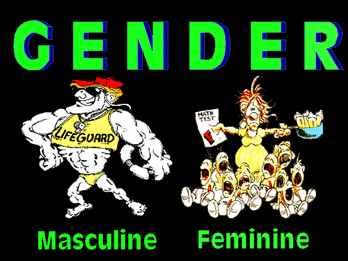The word “gender” refers to socially contracted roles, behaviors, activities, and attributes that a particular society considers and refers to. In most part of the world, gender works in a binary system that to a great extent forces an individual to fit into one of the two commonly accepted categories: male and female. In Gender Stories, Foss, Foss, and Domenico state that gender is organized into a male-female binary: "These two realms—feminine and masculine—are set up as opposites, in such ways that whatever is feminine is not masculine and whatever is masculine is not feminine" (15, 16).

"There are different ways in which gender has been conceptualized" (Foss, Foss, and, Domenico, 6-10):
1. Gender as equivalent to sex,
2. Gender as separate from sex,
3. Gender as the assignment of meaning to bodies.
Gender as equivalent to sex refers to the biological and physiological characteristics of an individual. The feminine and masculine traits are determined by one’s anatomy and physiology. Thus, it assumes that gender is decided at birth. If born with a penis, one is a male and can only become a male; if one born with a vagina, one is a female and can only become a female. Next stage in life will be pre-determined as one falls under a category of sex. Different institutions such as family, school, religion, etc, will further emphasizes on how to be a man or woman and one will learn on what it means to be masculine and feminine.
Gender as separate from sex distinguishes sex as biological characteristics and gender as social roles. Sex is determined and gender develops over time. This separation provides explanations of how masculinity and femininity can have a wide range of appearances and behaviors. Masculinity can account for male nurse, doctor, or soccer player. Femininity, on the other hand, can account for female truck driver, kindergarten teacher, or hip-hop dancer. A transgender person whose sex does not match his or her gender (social normative gender roles, attributes, and appearances), can be described through this definition of gender.
When gender-as-separate-from-sex concept provides a clear distinction between biological and behavioral traits, gender-as-the-assignment-of-meaning-to-bodies concept challenges us to think of both gender and sex as social constructions. As Wittig writes, “But for us there is no such thing as being-woman or being-man. 'Man' and 'woman' are political concepts…” (The Straight Mind, 29) and as Simone Beauvoir says, "one is not born but rather becomes a woman" (or one is not born a man), one should be able to choose his/her sex (man or woman) and have different gender roles at different times and situations because gender is not a stable aspect of a person.
In reality however, there is no exact definition of the word ‘gender’ because the subjectivity of an individual takes a role in understanding the meaning. Feelings, beliefs, and personal experiences influence one’s definition of gender. In Angels in America for instance, Kushner uses different personalities—Joe who comes from a strict Mormon culture or Louis who relates himself as Jewish and gay—to inform the readers of the various ways of defining gender.
The ‘masculine’ and ‘feminine’ categories also have aspects that vary greatly among societies. Some examples of gender characteristics are:
1. In Indonesia, women leave their jobs when they get pregnant and become full-time mothers.
2. In most of Southeast Asian countries, there are more men smokers than women smokers, because it is considered as inappropriate for females to smoke.
3. In the USA, men are better paid at work than women.
A woman who grows up in a liberal family in western society must have different interpretation on what it is like to be a woman than a woman who grows up in a conservative family in the Middle East. Thus, there is no single definition of gender.
Works Cited
Foss, Sonja K., Mary E. Domenico, and Karen A. Foss. Gender Stories: Negotiating Identity in a Binary World. Long Grove, IL: Waveland PressInc, 2012. Print.
Kushner, Tony. Angels in America. New York: Perseus D, 1995. Print.
Wittig, Monique. The Straight Mind: And Other Essays. Boston: Beacon Press, 1992. Print.